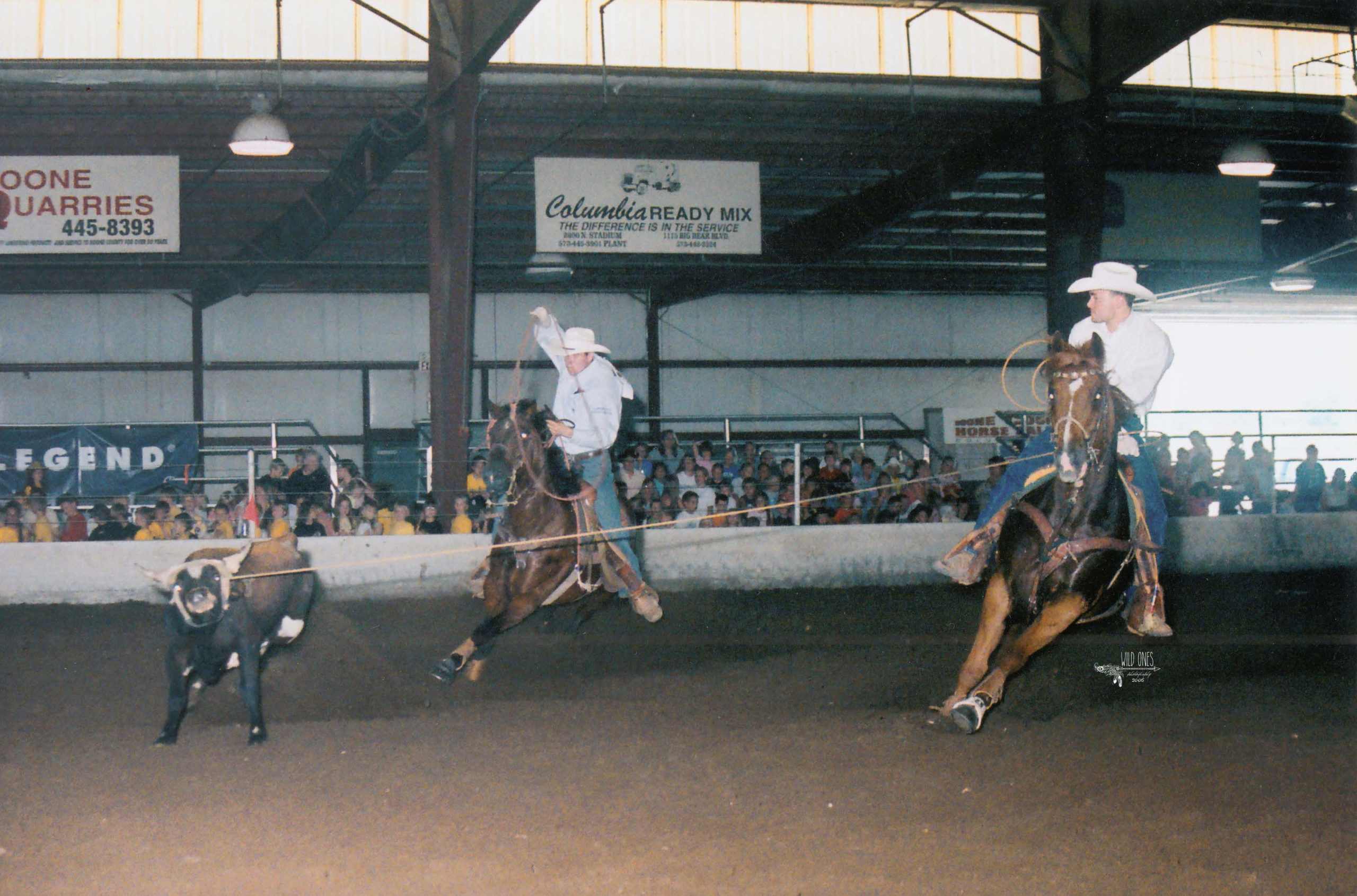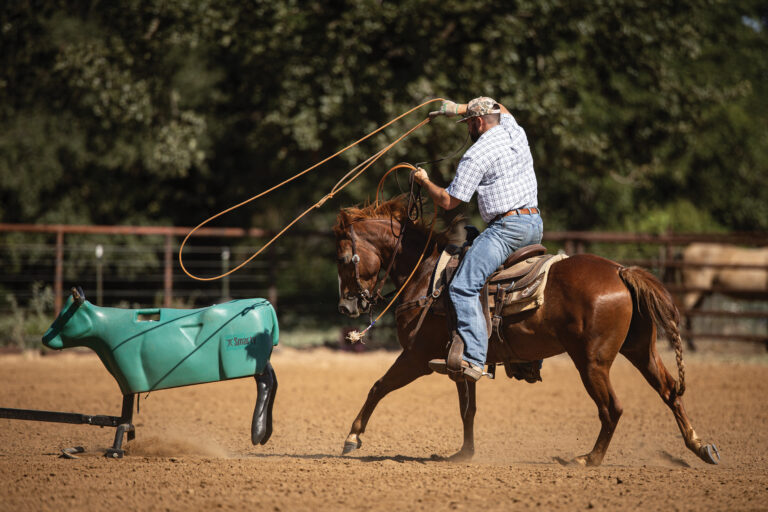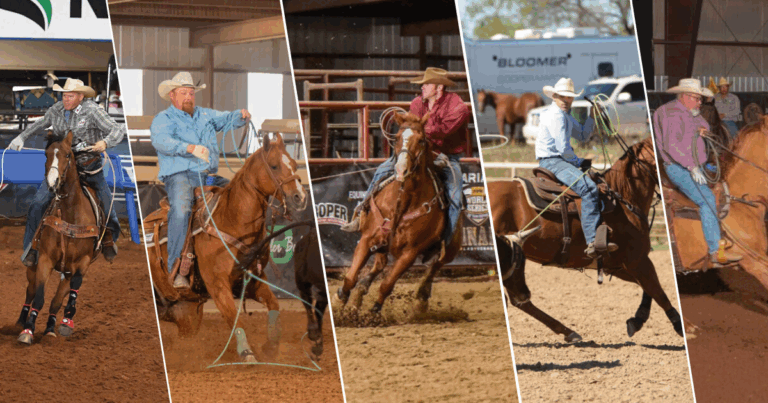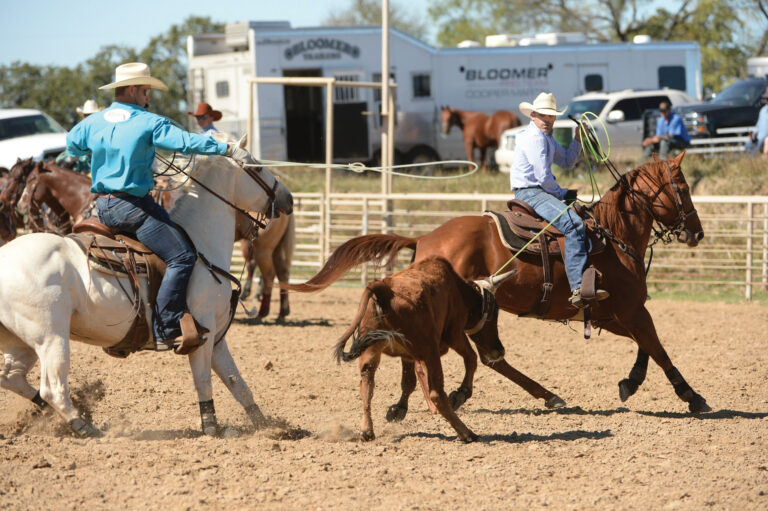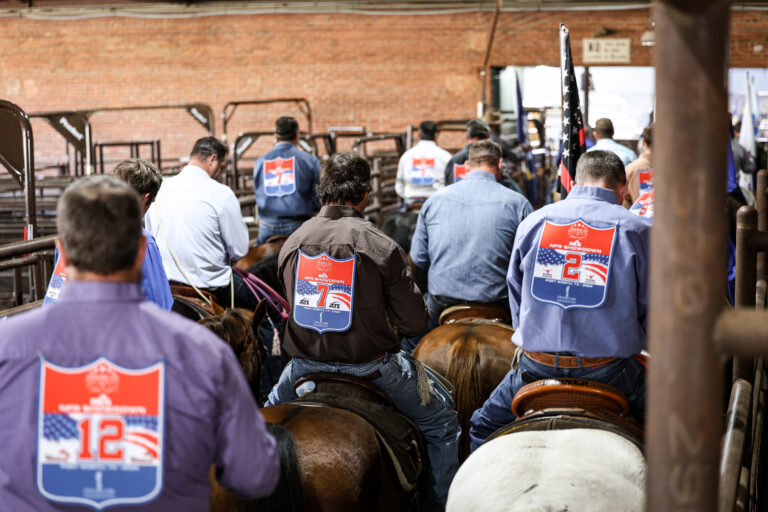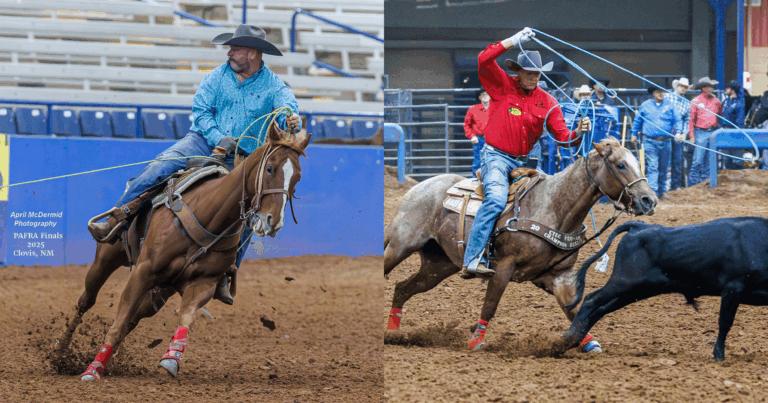Early this year, a letter was sent to The Team Roping Journal. It was composed by Sam Burke—a Missouri-born team roper who left the comforts of home to perform his patriotic duty and serve our country as a commissioned officer in the United States Marine Corps. His military career took him across the world, including Japan and Afghanistan and, as he transitioned toward civilian life, to the nation’s capital. For Burke, though, none of it inspired the same love of country that welled up within him when he attended the 2020 Wrangler National Finals Rodeo.
Originally published in 2021
In July 2020, Burke accepted employment in his first civilian role as the Operations Manager for the 2021 presidential inauguration. By December, he was up to his eyeballs in unforeseen turmoil and stress. But returning to rodeo to watch his fellow Missouri State High School Finals Team Roping Champion partner, Paul Eaves, win the World restored Burke.
As Fate Would Have It: Lovell and Eaves Win 2020 PRCA Team Roping World Titles in Inspiring Fashion
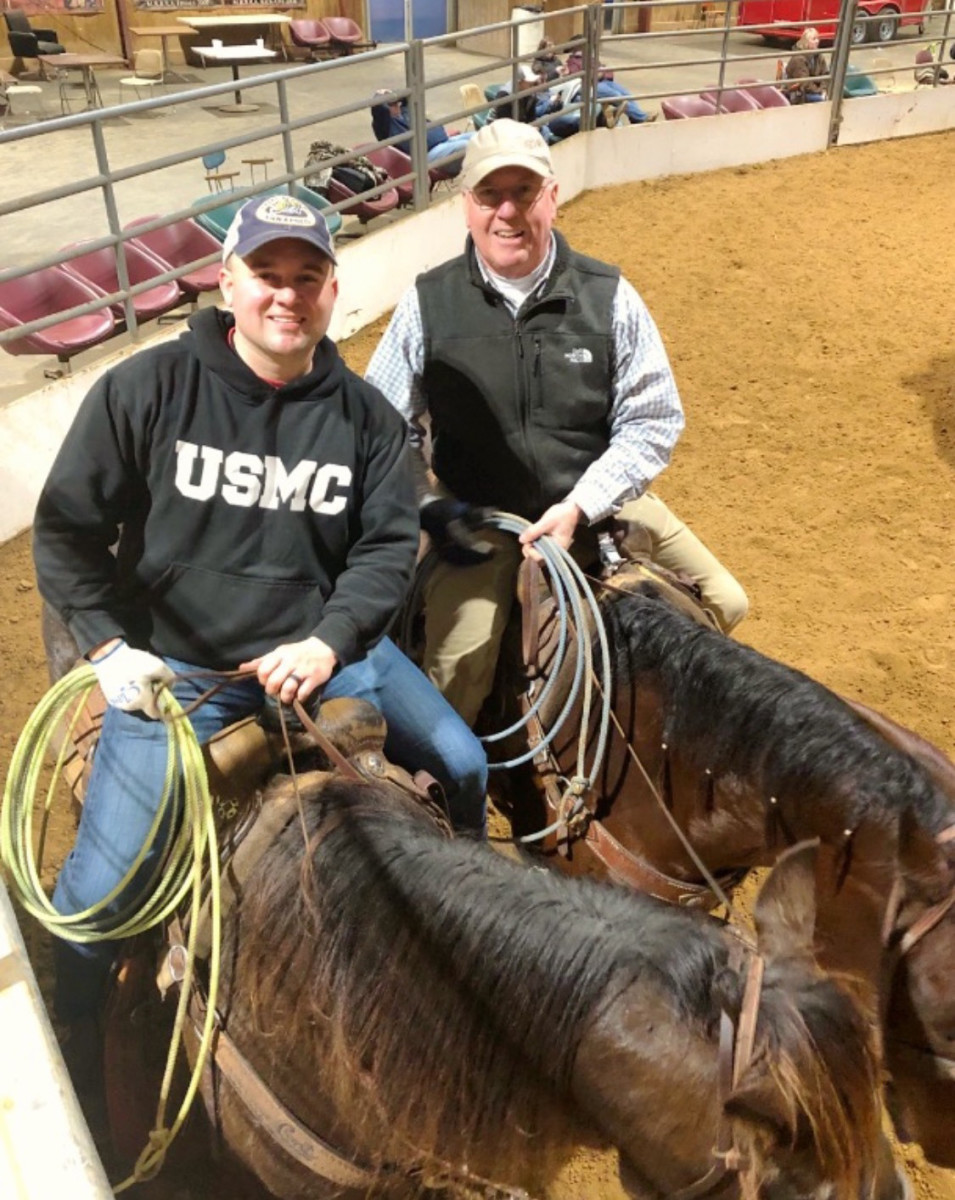
Roping Roots
Burke grew up a fourth-generation farmer in the same house in which his grandfather was raised. He followed his older brother into roping and, before long, his dad and uncle joined in to make team roping a true family affair.
“When I was a sophomore,” Burke said, “there was just this little kid who was tall, lanky, goofy-acting and a barrel racer named Paul Eaves. He grew up about an hour and a half down the road. He started going to these team roping deals. I gotta give the barrel racers due respect: he knew how to ride really well. Once he got the roping aspect down, he went from being a 10-year-old, goofy, lanky, barrel racing kid to a pretty dang good roper at 12, 13, 14 years old.”
According to Burke, Eaves was a 7-heeler by the time he was a sophomore, when the pair had been competing together regularly. They won the Missouri State High School Finals the year before and competed at Nationals, Burke a junior and Eaves a freshman. Then they took the state title again, the following year, but Eaves had to find a new partner for Nationals—Burke was going to boot camp.
“He’s super driven,” Eaves said of his old partner and his decision to join the military. “He knows what he wants and he’s going to go after it. He talked about it all the time. About what he was going to do, and he was going to go to the Naval Academy and get through that and have a high-up job. He was just super upbeat and happy about it. He was ready to go do it.”
At their last state finals in 2006, Burke and Eaves took their victory lap as the rodeo announcer told the crowd that Burke was Naval Academy bound. Eaves shared his partner’s excitement and gave him a hug. In return, Burke made a demand.
“I took my cowboy hat off right there and I said, ‘Paul, this is, without a doubt, my last rodeo I’ll ever get to rope in—sign my hat. You’re going to be a somebody in this team roping world someday. I want you to sign my cowboy hat.’
“He signed my cowboy hat that night, and it is still hanging over my mantle in my basement downstairs in Washington, D.C. I’ve kept it with me everywhere I go, and it’s a really fun possession for me. I love it.”
The men have kept in touch over the years, though sporadically. In 2014, Burke was on leave for the holidays and they met at Burke’s family farm to visit and rope—something Burke doesn’t get to do much of from his home in Washington, D.C., though in recent years, he and his dad have set aside time to go to Arizona each winter and rope at Dynamite Arena.
While his wife, Sarah, is pursuing her career on Capitol Hill, and his daughter is just a year old, those few weeks of roping are enough to satisfy Burke’s love of team roping. But he looks forward to the day when he can return to it, too.
“We’re kind of a Southern and Midwest-type family, and we’ll move back at some point one day. And, on a personal note, I just really want to get back into team roping pretty heavily. You know, teaching my daughter, who’s now only 13 months old. We’ve got time, but I want to get back into it. I really do. It’s a driving factor for me.”
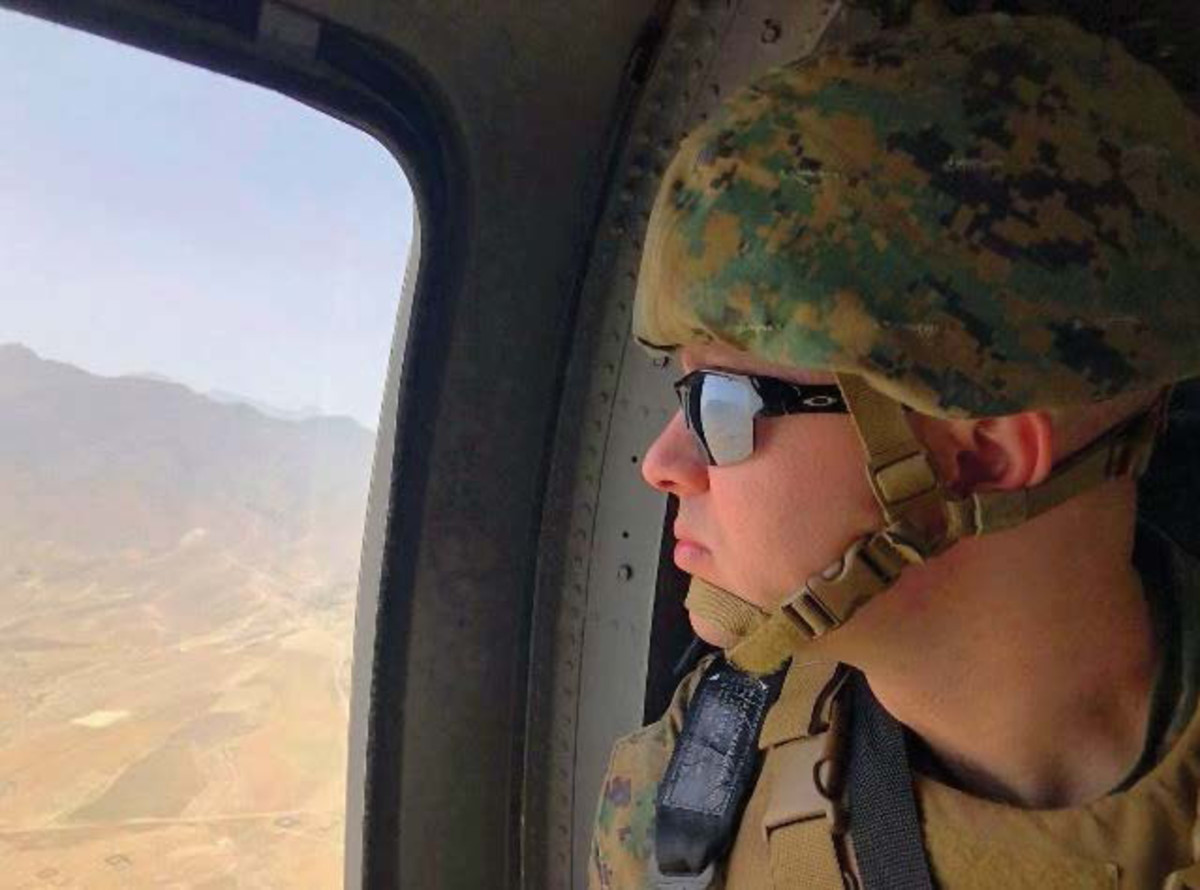
Makings of a U.S. Marine
In the beginning, Burke never imagined anything other than being a proud fourth-generation farmer, having some type of ag-related job, living happily in his home state of Missouri. But, shortly after the start of his eighth-grade year, he experienced the events of 9/11 and, by his sophomore year, war was officially waged and the United States had invaded Iraq.
“Every night, the nightly news report started with the War Report. You know, ‘Today in Iraq … Today in Afghanistan. Here’s how many we’ve lost, here are the faces of the fallen.’ And I was just in those formative years, and I thought, ‘I have got to be a part of this.’”
At his family’s encouragement, he joined the JROTC and spent the next few years as a young student of the military, learning its ins and outs and digging into its resources to determine his path forward. His good grades meant he could absolutely be a candidate for admission to a service academy, and he encountered all sorts of support for him to join the Navy, the Army and the Air Force.
“And every single one of them said, ‘Whatever you do, though, do not go into the Marine Corps.’”
Naturally, as Burke explains about his teenage self, he decided he needed to be a Marine.
“I had to do what was the most hard and the most prestigious and I said, ‘OK. I will go be a Marine Corps Commissioned Officer, and I will go to the Naval Academy.’ Everybody kind of told me how this wouldn’t work and wouldn’t happen and I just worked hard and, fortunately, I went in my senior year.”
Cowboy Connections
In his career travels, Burke has learned to pack light, but found that there’s almost always room for a rope. He volunteered at an orphanage in Japan and taught the kids how to rope. As he’s answering questions on this particular phone interview, he’s in a suit and tie and roping his dress shoe. And, during his last active-duty assignment, his rope provided more connections with political elite than he ever imagined possible.
“I got picked for this position in the Marine Corps where I got to travel with the senators. When the members of Congress in the House or Senate need to go overseas on an official delegation trip, they always have to take a military officer with them.
“I don’t get to pack a lot of personal stuff, but a little cowboy toy rope is something that I can easily stow away, and after a long day, I’ll just go to the restaurant in the deal and I’ll be sitting in the lobby with a cold beer and I’ll be kind of roping my foot and the senators are like, ‘Whoa, what is this?!’
“I bet you I have either shown how to rope or semi-taught probably five or six sitting U.S. Senators how to rope their foot. I can literally be walking down a hall and have a senator make a roping motion, like they’re throwing a loop at my head, in front of C-SPAN reporters or Congressional staff or whatever. I’m pretty proud of it,” Burke concluded, laughing.
Toward the end of Burke’s assignment, Missouri’s Sen. Roy Blunt approached him, wanting to know his plans as he transitioned out of the Marine Corps.
“He said, ‘Why don’t you call whoever you’re talking to and see if you can put that job on hold because I would like your first civilian job to be for me. I want you to come be my Operations Manager for the presidential inauguration.”
Burke said yes on the spot, proud to support his home state’s elected representative. He knew the COVID-19 pandemic would present demanding challenges. He did not anticipate the vitriol that sieged the country in the months surrounding the election and the impending inauguration.
“I tell you, try calling your dad on a farm on January 6 being in the Capitol Dome building,” he said.
But in the midst of a job that, at times, was downright miserable, Burke returned to his roots and rediscovered his patriotic spirit.
“There was something about going to the NFR in the middle of that experience of planning that inauguration [thinking], ‘Man, what in the world am I doing? What the heck is this all for?’ And then you get to a place like the National Finals Rodeo and I had never been struck with as much, just kind of patriotic awesomeness. It truly carried me, you know, kind of emotionally, through those next couples of months.
“I think one thing that I would just love to leave with is that it’s so easy, when you’re within the rodeo construct … you think it’s pretty good. You think it’s great. You think it’s the best life. But I don’t think you really get to have the utmost confidence in how great it is until you have truly left it and been in a position where you could not be involved with it.
“That’s what you get in Afghanistan in a war zone. That’s what you get in the middle of a political conflict in D.C. It’s just the most absolute and utmost confidence in just how wonderful of a construct it is, and I think that is what really charged me up to write it.”
Rodeo: Illuminating the Fabric of our Nation
by Sam Burke
In the summer of 2006, I had to let Paul Eaves know that I would be unable to rope with him at the National High School Finals Rodeo. I had just won the Missouri State High School Rodeo Team Roping title with an unknown 15-year-old kid who would eventually become a two-time World Champion Heeler. There was almost no place I would have rather been that summer than backing in the box with him.
While winning state and making it to nationals seems like it should have been at the center of my universe, at the epicenter of our nation’s universe was a war with radical Islamic extremism thousands of miles away. Whereas Paul’s journey took him in a very different direction than mine, we both had one critical component shaping our lives: we sacrificed for what we loved and followed our dreams. I got accepted to the United States Naval Academy in Annapolis, Maryland. As luck would have it, I had orders to report to boot camp approximately two weeks before the National High School Finals Rodeo commenced.
I eventually earned a commission as an officer in the Marine Corps, traveling the world in support of combat operations in the Middle East or humanitarian assistance and disaster relief missions in Southeast Asia. I would say I was part of the element that defended freedom and democracy; Paul was part of the entity that promoted them.
Paul won his first world title in 2018. I lived the majority of 2018 in what was the size of a shipping container in Afghanistan. It is not that hard to argue who had a better year! My last assignment in the Marines found me in Washington, D.C. working as a Department of Defense Liaison on Capitol Hill. I received an assignment to a senior U.S. Senator on the Intelligence Committee and Defense Appropriations Committee. I worked on issues ranging from national security and international relations to veterans’ initiatives. As I was completing a decade of government service and analyzing options in the private sector, I had one final assignment. In July of 2020, I got hired as the Operations Manager for the 59th Presidential Inauguration.
What appeared a fantastic way to complete a career in government service soon materialized into one of the most humbling challenges I have ever faced. Our country grew engulfed by the Coronavirus pandemic that impacted nearly every facet of daily life and even more so consumed with warring political oppositions facing November elections.
While the government appears to have an answer for everything, we as a country were navigating new territories. Businesses were closed, schools shut down, hospitals were overwhelmed, and professional sports significantly altered how they conducted a hybrid season. While these catastrophic occurrences were allowed to happen due to extreme circumstances, none of them are mandates of the Constitution.
If you look up the 20th Amendment of the Constitution, section 1 reads the following: “The terms of the President and Vice President shall end at noon on January 20th, and terms of Senators and Representatives at noon on January 3rd.”
The World Series may be viewed as one of the most iconic American cultural events. Still, not even the Constitution cares about baseball. A Presidential Inauguration, on the other hand, does not have the convenience of being able to be canceled, changed to a different day, or even be allowed to occur at night. Bottom line: Looking back to July of 2020, whoever was elected as President would be sworn in on January 20th, 2021.
It was not until late August or early September that our team realized the severity of our undertaking. While we navigated the months ahead, an increasing kinetic political environment and pandemic restrictions hindered our decision-making. There seemed to be little hope offered by mainstream media or daily evolving events in Washington D.C. While I struggled professionally, I had one major event to keep me motivated. I made plans to attend the 2020 National Finals Rodeo. Like many other professional sports, COVID impacted the NFR, moving from its original homestead in Las Vegas to Dallas.
I fully anticipated being recharged as anyone does when they are away from a stressful job. What I did not expect was to be re-inspired as an American citizen. Our founding fathers successfully established the longest-standing democracy in the world when they authored the Constitution; however, it seems challenging to find evidence of patriotism in vast parts of America today.
Upon entering the Globe Life Field in Arlington, Texas, the atmosphere alone gave me an immediate feeling of relaxation. Walking through the upper platform, the friendly smile of everyone combined with the excitement for rodeo was enough to keep me distracted from life in D.C.
I found my seat just in time to watch the round commence with live singing of the National Anthem. When I was a high school kid, playing of the National Anthem mandated that I stand and put my hand on my heart simply because that’s how I was raised. Deploying to a war zone or being rigorously exposed to 3rd world countries gives that song renewed context. While our nation’s hymn has been the subject of controversy in other sports, I did not see a single individual in a stadium filled with tens of thousands of people that were not proudly on their feet with hands on their hearts.
The display of respect and ruthless adherence to a concept our founding fathers fought so hard to create was only surpassed by the solemn prayer that followed. The contestants were there to participate in the event that is the pinnacle of their career, but they paused to focus for a moment on God. The audience in attendance carried countless signs with the names of their favorite contestants. Yet, they also gave ultimate respect to their creator putting down their I-phones, removing their hats, and remaining in humble silence.
There was nothing unique about the start of that round. While I was only fortunate enough to attend two nights in person, I watched the other eight rounds on T.V. Each night started the same, but with Americana tributes increasing in enthusiasm and creativity. An overly sized, brightly-lit cross dropped from the ceiling one evening. Military service members were sworn into active duty taking the oath of office on the arena floor another evening. Even the Governor of South Dakota carried the American flag!
You may find yourself wondering why any of this is a big deal to many reading this article. You might live in the same town you grew up in, or maybe you moved from one small town to another where this type of behavior is a frequent occurrence. Consider yourself fortunate. You are in an environment that does not deviate from the fundamental concepts of accountability, discipline, and selflessness.
Those surrounding you honor the flag, understand its root causes and are wholly adamant about “under God” remaining in the Pledge of Allegiance.
You either defended the freedoms articulated in the Constitution or are close to those that did. You do not live in a place where the national anthem is controversial. You live in an area that rewards hard work and devalues laziness. Unfortunately, these principles are not absolute throughout every town and city across our great nation.
As America seems to find itself in a crossroads struggling to maintain a strong cultural identity, it is more important than ever to popularize and elevate the sport of rodeo. We need to do so not just because of how much we love the sport, but because of how it honors and promotes the legacy of patriotic ideals framed in our Constitution.
Whether I was deployed as a Marine in Afghanistan or serving as the Operations Manager for a Presidential Inauguration, I was fortunate enough to have a front-row seat to our democracy in action. For that, I could not be more proud or grateful. For those who may feel you do not have access to such experiences, go to a rodeo. Cowboys and cowgirls don’t just stand for the national anthem, but they stand for the principles that make our nation greatest on earth. They are the embodiment of a rich cultural tradition that personifies character and integrity.
I want to give my thanks to the sport of rodeo for reminding me during a difficult time of planning the inauguration as to why extreme determination and sacrifice for our country will always be worth it. Also, I would like to personally congratulate my old partner Paul Eaves on another World Championship. Once again, you appear to have had the better year!




